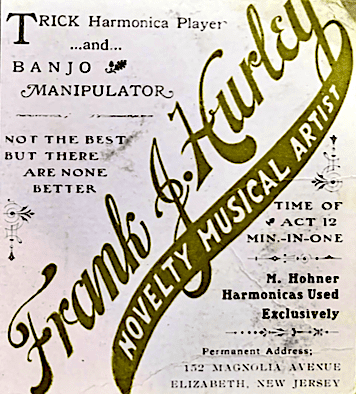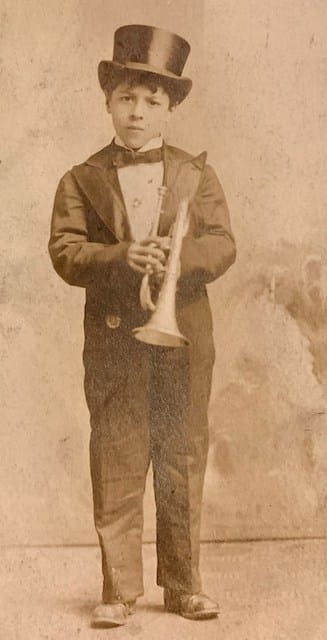“. . . But There Are None Better”
Frank J. Hurley
"Novelty Musical Artist"

The above postcard—one that might have been printed about 1910—is all of the tangible evidence we have as to the musical entertainment career of Frank J. Hurley.
What we can glean is that Hurley saw himself as a professional entertainer—or at least an aspiring professional entertainer. He was willing to put a little extra effort into selling himself: the dark suit, the bowtie, the boutonniere, and the long ribbon on his banjo. And regarding the postcard itself, he paid extra for some fancy design work on this piece of advertising.
In our day and age it would be professional suicide to bill oneself as a “novelty” musician. In Hurley’s era most attendees at a musical performance wanted knee-slapping entertainment, not culture. Thus, Hurley came prepared to give his audience what it wanted: trick harmonica playing, banjo manipulation, and the ringing of bells at his toes.

Print ad from 1904 for five-string banjo.
If you had any doubt as to the quality of Hurley’s show you were assured that he only played the best brand harmonicas, Hohners. Plus, you could see by looking at the picture on the postcard that Hurley would be doing more than fast strumming a modern four-string banjo, a technique becoming more and more in vogue. Rather, he would perform on the old-fashioned five-string banjo, an instrument requiring real musical skill—or as Hurley would say, “manipulation”.

Magazine advertisement for Hohner harmonicas, 1922.
To add a bit of tongue-in-cheek promotion, Hurley reminded the reader of his postcard that he was “not the best but there are none better.” Perhaps a quirky way to promote oneself, but it does show the man had a sense of humor.
If you were interested in hiring Frank J. Hurley—a one-man band— for a musical engagement he could be contacted at 152 Magnolia Avenue, Elizabeth, New Jersey.
And that-the printing on a postcard-is all that we know today about Frank J. Hurley, the musician living in Elizabeth over one hundred years ago.

Elizabeth, New Jersey, about 1910.
During this time period there was also a blue-collar worker named Frank J. Hurley who lived in Elizabeth.
On November 7, 1881, Francis John (later known as Joseph) Hurley was born in Elizabeth, the eldest child of John and Elizabeth Hurley, whose parents had immigrated from Ireland. At this time, John Hurley was working for a railroad. Later he would work as both a chemist and a machinist. Elizabeth stayed home to raise their seven children.
At the time of Francis’ (Frank’s) birth the community of Elizabeth had already developed into an industrial, shipbuilding city of about 30,000 inhabitants. And it was growing. There would always be blue collar jobs awaiting Frank and his siblings.
Frank, except for one period of time around 1910, would always lived with his family in Elizabeth, at least up to the 1940 Federal census. He apparently did not marry. He could read and write, although some records indicate he had not gone to school. In his early years he worked as a machinist in a Singer Sewing Machine factory and later became a meter reader for the local utility company. In 1947, he applied for Social Security benefits. In 1958 he died and was buried in Newark, New Jersey, across the bay, next to his parents’ graves.
We know more about this Frank than the other Frank.
On first blush these two Frank J. Hurleys of Elizabeth, New Jersey—entertainer and blue collar worker—don’t appear to have much in common.
But they are the same person.

The clues come from the World War I and World War II draft cards for Frank J. Hurley.
In 1910 Hurley was no longer living with his family, although he was back under its roof by 1920. So for a period of time we can’t account for his whereabouts. Was this when he was pursuing a show business career? At least we are sure that, according to his 1918 draft card, he had been living for the past year at 152 Magnolia Avenue in Elizabeth, New Jersey, the same address he was using on his advertising postcard.
Now look at Hurley’s signature at the bottom of his 1918 draft card.

Next, look at Hurley’s signature at the bottom of his 1942 draft card.

Compare those two signatures to Hurley’s elegant script name on his advertising postcard.

In all three cases the writing is the same. Either Hurley had an extremely elegant signature to begin with, such that he asked the printers to use it on the postcard; or, he took the writing style used by the printers, replicating it as his own signature. Either way, there is no doubt that the script is the same on the postcard as it appears on his draft card signatures.
Frank J. Hurley started his working life as a blue-collar laborer in Elizabeth, New Jersey, and ended it as such, but for a time he was able to escape the humdrum of blue-collar life in an industrial town and pursue a musical dream.
He added a boutonniere to his lapel. He carefully took his banjo out of its case. He adjusted the rack for his Hohner harmonica. And he positioned his bells on the floor. Now he was ready. After all, as a musical entertainer “he [was] not the best but there [were] none better”.
Now that’s worth paying admission!

Note: With the exception of the draft cards, all graphics and ephemera are from the Bowman collection.

